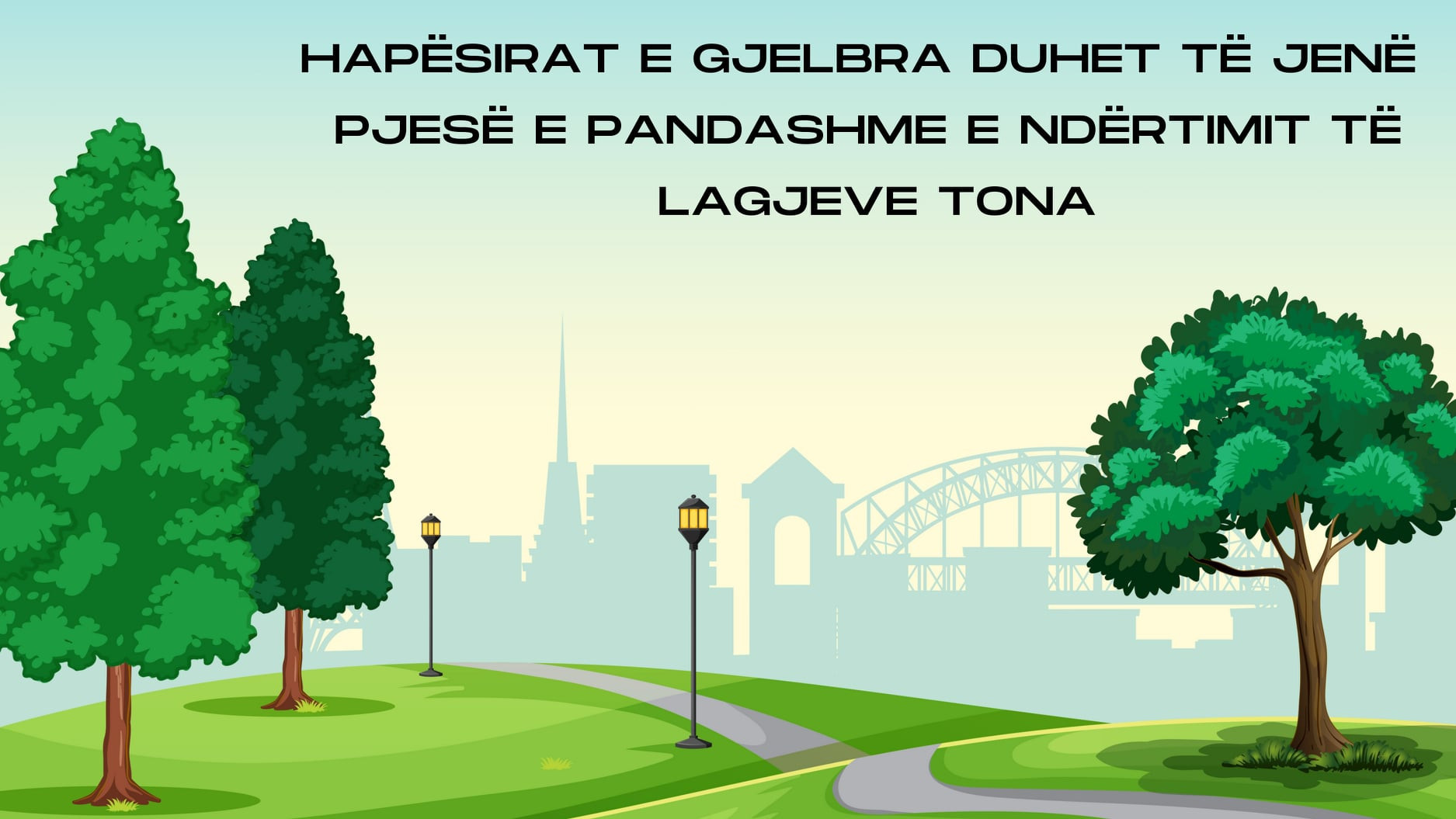Green spaces should be an integral part of the construction of our neighborhoods

Green spaces within cities are key elements that influence the proper functioning of an urban structure that ensures the well-being of residents. Today, when pollution and its consequences on humans and ecosystems are becoming more and more evident, a green vision for the city has become more than necessary. In such a situation, green spaces are efficient tools that can be used to fight climate change, to create sustainability of our cities and to raise the quality of life for citizens within urban neighborhoods.
In Kosovo, the urban planning process, which should be a tool for solving many problems in a living environment, has not functioned properly for years and consequently, the process of urban expansion has been allowed to become one of the greater environmental and civic welfare threats.
Today we are faced with population concentration in cities - with overpopulation of urban environments, these environments constructed in an uncontrolled manner. Intensive constructions and without urban planning criteria have led us to face city neighborhoods, which in most cases do not meet the essential conditions for living. All of this has come as a result of construction for a long period through legal violations, and as a result today has created urban areas that make the daily life of the residents difficult and contribute to continuous pollution that threatens the environment and the lives of citizens.
As cities become denser and concern about the impact of climate change increases, a greater focus must be placed on the construction of green spaces and their potential as tools to provide sustainability within our settlements.
Studies are showing that green spaces can be an answer to urban environmental pollution. They help fight pollution, encourage the development of biodiversity within cities and help control temperatures and humidity. These spaces reduce harmful carbon pollution that drives climate change by protecting residents, ecosystems and infrastructure from ecological disasters such as storms, heat waves, droughts; flooding, and also avoid some of the primary public health challenges intensified by urban pollution. Interventions in the expansion of green space within cities increase the potential to contribute to the progress of many goals and objectives of the 2030 Agenda because through the creation of these green areas it is possible to achieve the mitigation of climate change and to create cities that fulfill the needs of the community.
Green spaces provide numerous environmental benefits and improve the quality of life for citizens in urban areas, as well as the reducing of water pollution, protecting drinking water and reducing the rate of water-borne diseases. Urban green spaces can also help cool our cities, reducing the "heat island" effect, which are urbanized areas that experience higher temperatures than suburban areas. Structures such as buildings, roads and other infrastructures absorb and re-emit the sun's heat more than natural landscapes such as forests and water bodies, therefore a green area in a neighborhood significantly affects the improvement of these parameters.
Also, green spaces offer opportunities to increase the quality of life and maintain public health. Improving our physical and psychological health, strengthening communities and making our cities and neighborhoods more attractive and sustainable places are just some of the benefits.
Our cities still continue to face major drawbacks in terms of green spaces. In some research carried out by EC with citizens of the municipalities of: Prizren, Ferizaj and Gjakovë, they were asked if they were ever invited by the municipal institutions to discuss and offer proposals about green spaces in their municipalities. 88% of the citizens in Prizren have emphasized that they have never accepted an invitation from the institutions to offer proposals, while relatively the same percentage is also in the other 2 municipalities: about 67% of the citizens of Ferizaj and 90% of the citizens of Gjakova expressed that they were not invited by the institutions to discuss such issues.
Local and central level institutions should urgently start and prioritize the implementation of green policies and apply the principle of citizen inclusion in planning in order to improve the quality of life of citizens. Kosovo has legislation that defines the general and special conditions for the protection of the environment from various forms of pollution, the protection of people's lives and health, as well as the protection of the environment and the impact would be evident in improving the current situation if the stakeholders will function in accordance with the provisions of the legislation in force, such as the Law on Environmental Protection 03/L-025 (Official Gazette No. 50/2009); Law on Strategic Environmental Assessment 03/L‐015 (Official Gazette No. 49/2009); Law on Environmental Impact Assessment 03/L‐024 (Official Gazette No. 50/2009); Law on Integrated Pollution Prevention and Control 03/L‐043 (Official Gazette No. 52/2009); Law on Noise Protection 02/L‐102 (Official Gazette No. 40/2008), etc.
Green spaces bring nature into the city in many ways, they play the role of bridges, providing benefits of various dimensions both to the ecosystems and to the residents themselves. They should be an integral part of the urban planning process because they play an important role in the sustainable development of cities, therefore the cities of Kosovo should also prioritize the enrichment of urban areas with green spaces, respect the urban and environmental criteria and not allow promiscuous interventions to be applied within the city spaces that make life difficult for citizens and bring long-term consequences to both human health and ecosystems.




